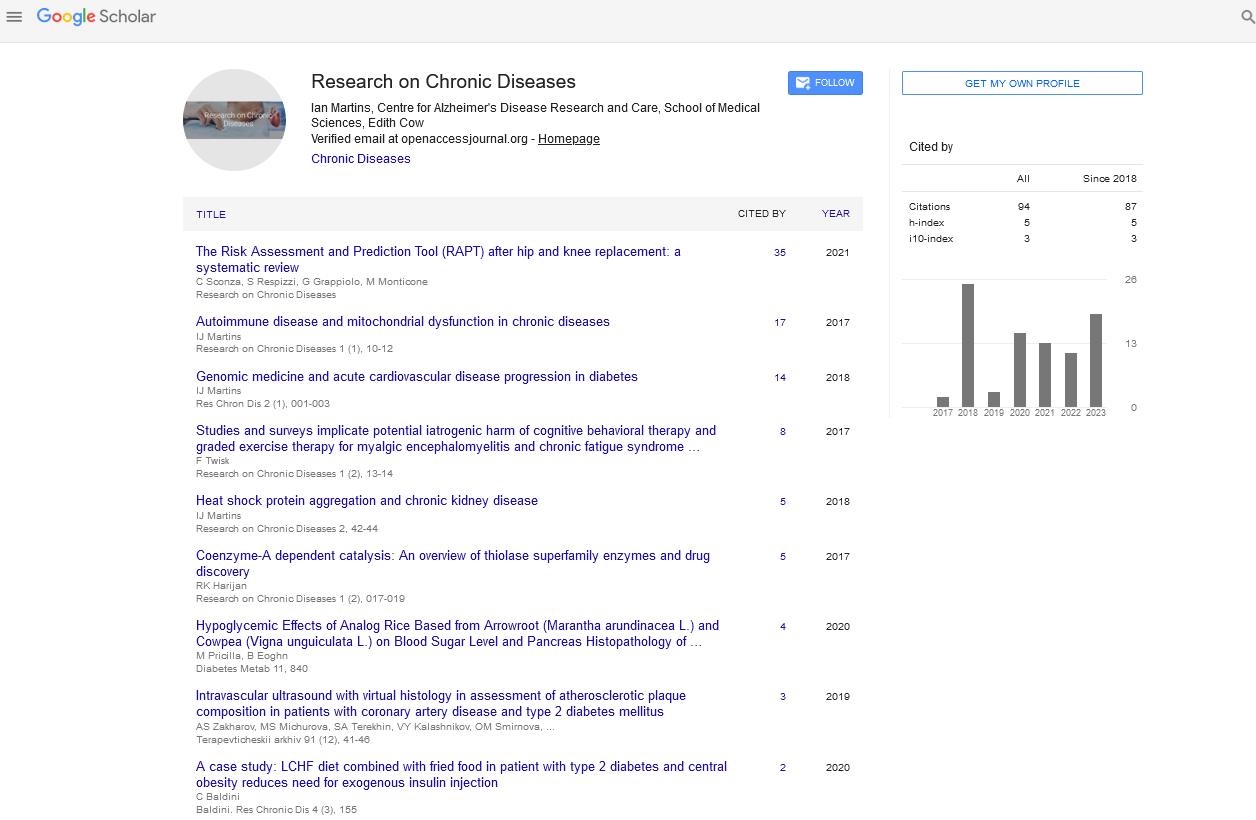Perspective - Research on Chronic Diseases (2023) Volume 7, Issue 6
Understanding Kidney Disease: Navigating the Complexities and Promoting Wellness
- Corresponding Author:
- Josephine M Kyei
Department of Internal Medicine, University of Ghana, Accra, Ghana
E-mail: Phine@ug.edu.gh
Received: 07-Nov-2023, Manuscript No. OARCD-23-119481; Editor assigned: 09-Nov-2023, PreQC No. OARCD-23-119481 (PQ); Reviewed: 23-Nov-2023, QC No. OARCD-23-119481; Revised: 30-Nov-2023, Manuscript No. OARCD-23-119481 (R); Published: 07-Dec-2023, DOI: 10.37532/OARCD.2023.7(6).121-122
Introduction
The kidneys, those unassuming bean-shaped organs nestled in the lower back, play an outsized role in maintaining our overall health. These vital organs, about the size of a fist, serve as the body’s filtration system, removing waste and excess fluids, regulating electrolytes, and producing essential hormones. However, kidney disease, a condition often under recognized, poses a significant health threat to millions worldwide, impacting individuals of all ages and backgrounds.
Unveiling the complexity of kidney disease
Kidney disease, also known as renal disease or nephropathy, encompasses various conditions that impair kidney function, leading to the accumulation of waste and fluids within the body. The most common types include Chronic Kidney Disease (CKD), Acute Kidney Injury (AKI), Polycystic Kidney Disease (PKD), and glomerulonephritis.
Chronic Kidney Disease (CKD): This condition is characterized by the gradual loss of kidney function over time. CKD is often asymptomatic in its early stages, only manifesting symptoms when the kidneys are significantly impaired. Diabetes and high blood pressure are leading causes of CKD.
Acute Kidney Injury (AKI): AKI occurs suddenly, leading to a rapid decrease in kidney function. This can result from various factors such as dehydration, severe infection, blood loss, or medication.
Polycystic Kidney Disease (PKD): PKD is a genetic disorder characterized by the growth of numerous cysts within the kidneys, leading to their enlargement and potential impairment.
Glomerulonephritis: This condition refers to inflammation in the kidney’s filtering units (glomeruli). It can be acute or chronic and often arises from infections or autoimmune diseases.
Description
Recognizing risk factors and symptoms
Kidney disease often develops gradually and without symptoms, leading to its classification as a “silent” condition. However, several risk factors can increase the likelihood of developing kidney problems:
Diabetes and hypertension: Individuals with uncontrolled diabetes or high blood pressure are at a higher risk of kidney disease.
• Family history: Genetic factors play a role, especially in conditions like PKD. • Age and gender: The risk of kidney disease increases with age, and men are slightly more prone to kidney problems than women.
While symptoms might not be immediately noticeable, some common signs of kidney disease can include fatigue, swelling in the ankles, feet, or hands, difficulty concentrating, decreased urine output, and blood in the urine. Regular health check-ups and screenings can aid in the early detection and management of kidney issues.
Impact and challenges faced by patients
The implications of kidney disease are multifaceted and can significantly impact an individual’s quality of life. Physical symptoms such as fatigue, swelling, and difficulty concentrating can affect daily routines and work productivity. Emotional challenges, including stress, anxiety, and depression, often accompany the burden of managing a chronic condition.
Treatment options for kidney disease vary depending on the specific condition and its severity. For CKD, management strategies may include medications to control blood pressure, dietary changes, and, in severe cases, dialysis or kidney transplant. Patients facing PKD may require treatment to manage symptoms and slow the progression of cyst growth. AKI might necessitate addressing the underlying cause, such as rehydration or medication adjustments.
Promoting kidney health and wellness
Prevention and lifestyle modifications play a crucial role in maintaining healthy kidneys and preventing kidney disease progression. Some practical steps to promote kidney health include:
Balanced diet: A diet low in salt, saturated fats, and added sugars while high in fruits, vegetables, and whole grains can support kidney health.
Hydration: Staying adequately hydrated is essential for kidney function. Water is the best choice for hydration.
Regular exercise: Engaging in physical activity supports overall health, aiding in the prevention of conditions like diabetes and hypertension.
Regular check-ups: Routine screenings to monitor blood pressure, blood sugar, and kidney function can help detect issues early.
Innovations and hope for the future
Research and medical advancements continue to offer hope for improved treatments and early detection of kidney diseases. Innovations in regenerative medicine, artificial intelligence for early diagnosis, and the development of more effective medications aim to enhance patient outcomes and quality of life.
Kidney transplantation, as a life-saving treatment for end-stage renal disease, has seen significant progress in surgical techniques and organ preservation. Moreover, ongoing studies into bioengineering of kidneys and 3D printing hold the promise of potentially creating synthetic organs to address the shortage of donor kidneys.
Conclusion
Kidney disease, with its multifaceted nature and impact on individual health, remains a critical health concern. Raising awareness, early detection, and promoting lifestyle modifications are pivotal in managing and preventing kidney issues. As research and medical advancements continue to evolve, there is optimism for improved treatments, greater awareness, and enhanced support for individuals navigating the complexities of kidney disease. Ultimately, understanding the significance of kidney health and adopting proactive measures contribute significantly to overall well-being and longevity.
